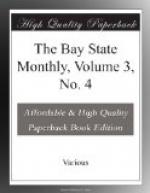Helen Maria (Fiske) Jackson was the daughter of Prof. Nathan W. Fiske, of Amherst College, whose “Manual of Classical Literature,” based on that of Eschenberg, was long in use in our colleges, and who wrote several other books. She was born in Amherst, Mass., October 18, 1831; her mother’s maiden name being Vinal. The daughter was educated in part at Ipswich (Mass.) Female Seminary, and in part at the school of the Rev. J.S.C. Abbott in New York city. She was married to Captain (afterward Major) Edward B. Hunt, an eminent engineer officer of the United States Army. Major Hunt was a man of scientific attainments quite unusual in his profession, was a member of various learned societies, and for some time an assistant professor at West Point. He contributed to one of the early volumes of the Atlantic Monthly (xii, 794) a paper on “Military Bridges.” His wife resided with him at various military stations—West Point, Washington, Newport, R.I., etc.—and they had several children, all of whom died very young except one boy, Rennie, who lived to the age of eight or ten, showing extraordinary promise. His death and that of Major Hunt—who was killed in 1863 by the discharge of suffocating vapors from a submarine battery of his own invention—left Mrs. Hunt alone in the world, and she removed her residence a year or two after to Newport, R.I., where the second period of her life began.
Up to this time she had given absolutely no signs of literary talent. She had been absorbed in her duties as wife and mother, and had been fond of society, in which she was always welcome because of her vivacity, wit, and ready sympathy. In Newport she found herself, from various causes, under strong literary influences, appealing to tastes that developed rapidly in herself. She soon began to publish poems, one of the first of which, if not the first—a translation from Victor Hugo—appeared in the Nation. Others of her poems, perhaps her best—including the sonnets “Burnt Ships” and “Ariadne’s Farewell”—appeared also in the Nation. Not long after, she began to print short papers on domestic subjects in the Independent and elsewhere, and soon found herself thoroughly embarked in a literary career. Her first poem in the Atlantic Monthly appeared in February, 1869; and her volume of “Verses” was printed at her own expense in 1870, being reprinted with some enlargement in 1871. and again, almost doubled in size, in 1874. Her “Bits of Travel” (1872) was made up of sketches of a tour in Europe in 1868-9; a portion of these, called “Encyclicals of a Traveller,” having been originally written as circular letters to her many friends and then printed—rather against her judgment, but at the urgent request of Mr. J.T. Fields—almost precisely as they were written. Upon this followed “Bits of Talk About Home Matters” (1873), “Bits of Talk for Young Folks” (1876), and “Bits of Travel at Home” (1878). These, with




